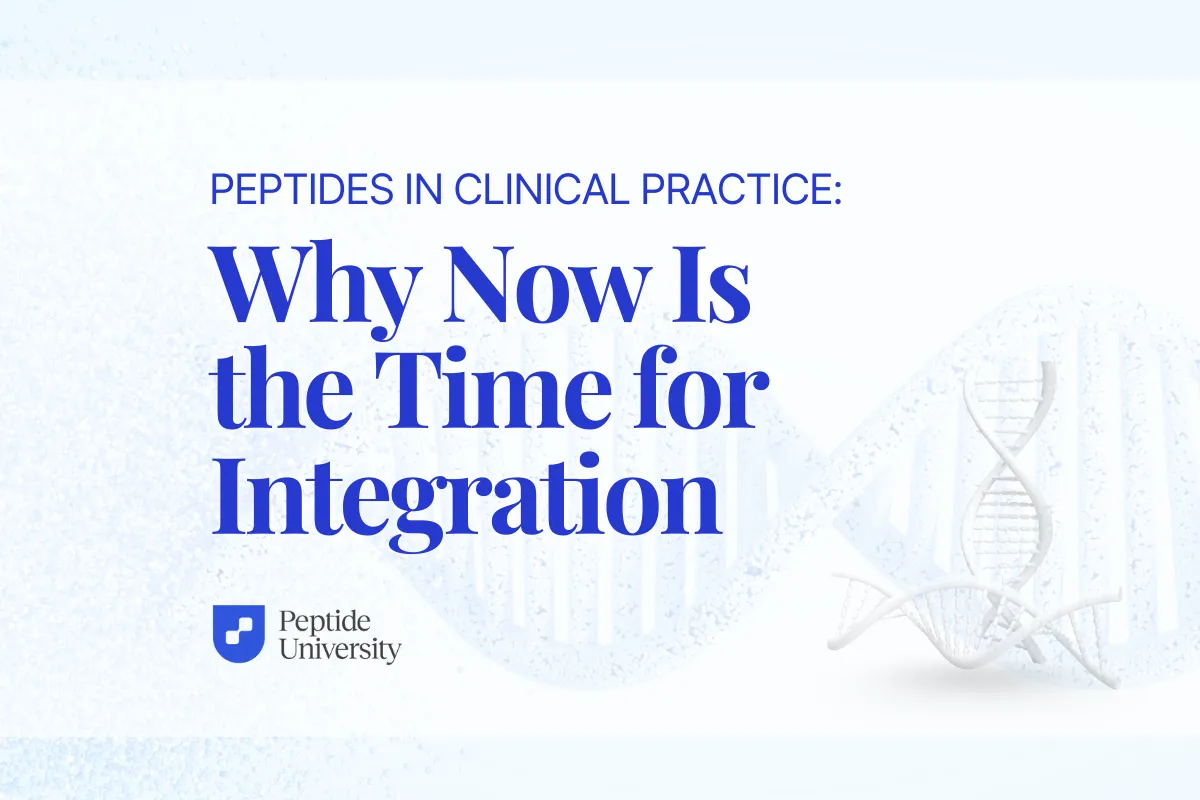
Peptides in Clinical Practice: Why Now Is the Time for Integration
The Rising Demand for Next-Generation Clinical Tools
Walk into any integrative, functional, or regenerative medicine practice today, and you’ll hear the same themes: patients are searching for more precise, personalized, and effective therapies. Chronic disease, accelerated aging, and stress-related conditions continue to rise, while conventional options often fall short of delivering lasting results.
Enter peptide therapy—small but powerful molecules that are reshaping how clinicians approach healing and performance. What was once niche research has now become a cornerstone of advanced clinical practice worldwide.
So the question for every practitioner isn’t if peptides will become part of their tool belt—it’s when, and how well.
Clinical Faculty Insight:
The practices that thrive in the next five years will be those that integrate peptide therapy now, positioning themselves ahead of patient demand.
What Are Peptides and Why Do They Matter Now?
Peptides are chains of 2–50 amino acids that act as signaling molecules in the body. They regulate everything from immune activity and inflammation to metabolic function, cognition, tissue repair, and sexual health.
Unlike pharmaceuticals that often target one receptor or pathway, peptides are pleiotropic—they orchestrate multiple healing cascades simultaneously. This makes them ideal for integrative clinicians who need to address root causes, not just symptoms.
The science is accelerating rapidly. PubMed now indexes more than 80,000 studies on peptides, with research growing annually across metabolic, neurocognitive, immune, and regenerative medicine fields.
In Fact:

Immune Activity: Peptide therapies have been shown to modulate immune activity in autoimmunity and infection resilience (Khavinson et al., 2020).
Tissue Healing: Peptides like BPC-157 and TB-500 demonstrate tissue healing and angiogenic properties, supporting recovery from injury and surgery (Gwyer et al., 2022).
Cognitive Function: Cognitive peptides such as Semax and Dihexa enhance neuroplasticity and memory formation, opening new doors in neurodegenerative disease care (Ashmarin et al., 2018).
(References: Khavinson V, et al. Biogerontology. 2020; Gwyer D, et al. Front Pharmacol. 2022; Ashmarin I, et al. J Neurosci Res. 2018).
Clinical Areas Where Peptides Shine
Practitioners are already finding success using peptides in high-demand areas of care:
Metabolic Health & Weight Optimization
GLP-1 analogues, MOTS-c, and 5-Amino-1MQ are redefining the landscape of weight loss and insulin resistance management.Regenerative & Musculoskeletal Care
Peptides accelerate recovery, reduce inflammation, and support tendon and ligament repair—essential for athletes and active patients.Cognitive & Mental Health
With burnout, brain fog, and neurodegeneration on the rise, peptides that enhance BDNF and neuroplasticity are in high demand.Immune Resilience
Thymic peptides like Thymosin Alpha-1 and KPV support balance in immune modulation, a critical need in the post-pandemic era.Longevity & Anti-Aging Medicine
Bioregulators such as Epitalon and Pinealon have shown promise in extending healthspan by influencing gene expression and slowing cellular aging.
Clinical Faculty Insight:
Patients aren’t just asking for symptom relief—they’re asking for strategies that keep them younger, sharper, and stronger. Peptides meet that demand.
Why Integration Matters for Practitioners
Adding peptides to your practice isn’t just about better outcomes—it’s about practice growth and sustainability:
Retention: Patients who experience meaningful improvements in energy, healing, and performance come back for continued care.
Referrals: Word-of-mouth spreads quickly when patients experience rapid, noticeable changes.
Revenue: Peptides create new service lines, product offerings, and bundled programs that increase profitability without increasing overhead.
Results: At the heart of it, patients get better faster—and that’s what keeps clinicians passionate about their work.
Overcoming Barriers: Knowledge, Safety, and Legal Considerations
For many practitioners, the hesitation to begin peptide therapy comes down to three concerns:

Knowledge Gap – Not having the training to know which peptides to use, how to dose them, or how to integrate them into protocols.
Safety & Evidence – Wanting clear research-based guidance, contraindications, and clinical pearls to avoid trial-and-error.
Legal & Regulatory Awareness – Navigating research-only versus compounded peptides, informed consent, and compliance in practice.
This is exactly where Peptide University was designed to help.
How Peptide University Supports Clinicians
Peptide University is the global leader in clinical peptide education—built for practitioners, by practitioners.
Inside our membership and certification programs, you’ll find:
Foundational Science: Mechanisms, pathways, and current research.
Clinical Protocols: Ready-to-use guidance for top conditions like metabolic health, immune support, and regenerative medicine.
Dosing Guidelines: Practical charts and pearls for safe and effective use.
Business Integration: Systems to monetize peptides while staying compliant.
Community Access: Ongoing clinical calls, peer discussion, and mentorship from leading peptide experts.
Whether you’re new to peptides or already prescribing, you’ll leave with confidence, clarity, and clinical strategy.
The Time Is Now
Patients are asking. The science is clear. And the need for new, effective, and integrative therapies has never been greater.
Peptides aren’t the future—they are the present.
The clinicians who embrace them now will set the standard for Healthcare 3.0, delivering not just care, but true transformation.
👉 Explore more on this topic inside our masterclasses at MyPeptideUniversity.com


